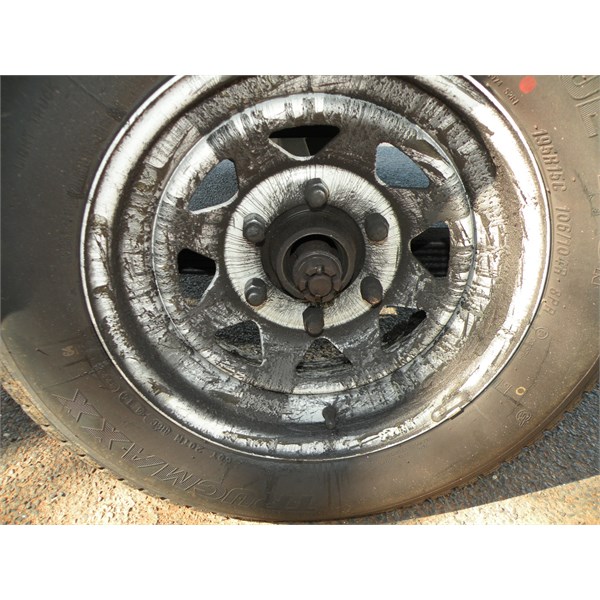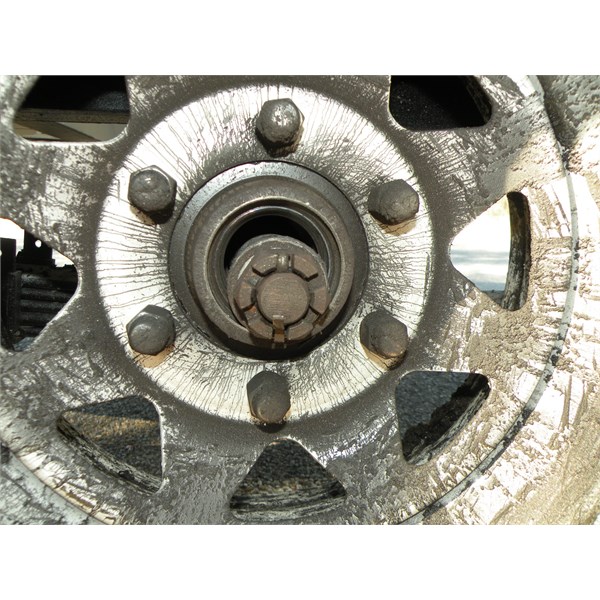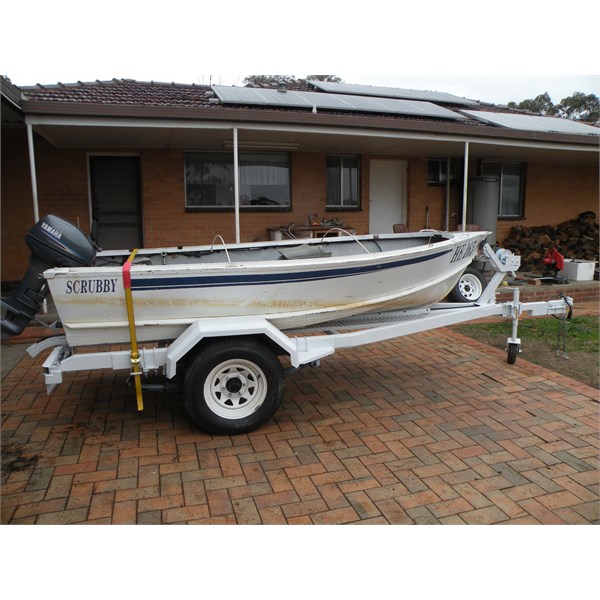Boat Trailer Bearing Cap problem ?.
Submitted: Monday, Aug 10, 2015 at 20:39
ThreadID:
129944
Views:
4370
Replies:
9
FollowUps:
8
This Thread has been Archived
Member - Scrubby (VIC)
G`day all,
I built an "Off Road" Boat Trailer for my recent trip to
Cape York. I am very pleased with the way it handled the rough roads but disappointed to have two wheel bearings and hubs fail, each time it was the same left side wheel and each time it was while travelling on a bitumen highway, first was 61 klm N of
Charleville on the way North to the Cape from Huntly Vic, second was 76 Klm N of
St George on the way home.
The Hubs were six stud L/cruiser with parallel bearings with 15" steel wheels and L/Truck tyres, all new.
I reckon the cause was the bearing cap "falling" off and allowing loss of grease and the ingress of dirt etc.
Why did the caps come off ?? I don`t know.
They shouldn`t fall off again as they are now the type with an expanding rubber grommet for ease of greasing, and the cap is tack welded onto the hub.

Bearing problem

Cap gone = Hub, Bearings & Seals stuffed
Photos of the first time it occurred.
Scrubby.
Reply By: GerryG - Monday, Aug 10, 2015 at 21:41
Monday, Aug 10, 2015 at 21:41
I've been operating 4WD safaris in the outback for over 40 years and I soon learnt to do a few things to trailers. First was to hold the bearing cap in place with a 25mm wide strip of tin and shaped like a "U" with tags on the ends. The "U" bit goes over the actual cap and is held in place by the tags that go between the wheel and the hub. I'd draw a picture if I new how to send it on this page. I've never had a cap come off.
Another thing I do is put two chains between the drawbar and the axel. (one each side). I keep them loose so if I ever see either one tight I know that I have broken a centre pin, U bolts or a spring. The chains prevent the axel drifting back until the tyre hits the mudguard, usually destroying tyre and the guard.
I always plate the A frame where it actually departs the trailer body at the front as this is where the A frame will bend if it's going to.
Regards, GerryG.
AnswerID:
589107
Reply By: Ozhumvee - Monday, Aug 10, 2015 at 21:42
Monday, Aug 10, 2015 at 21:42
Had a similar problem years ago on a camper trailer I fitted a solid axle to replace the pipe axle that bent.
Like you did two sets of bearings, one on the outgoing and one on the return trip.
Put the axle between centres and spun it and one end was very slightly bent between the inner and outer bearing mounting points, must have been dropped between manufacture and being sold. Was replaced by the supplier and the trailer went on to cover several hundred thousand k's on the replacement without problems.
AnswerID:
589108
Reply By: Steve in Kakadu - Monday, Aug 10, 2015 at 22:58
Monday, Aug 10, 2015 at 22:58
Running Landcruiser rims on a Ford Holden bearing will do this every time, use a 2.2 tonne axle and the bigger bearings and you will never need to worry again.
We have two 5 meter boats going to the cape next year, we are putting them on the barge from
Cairns and back.
It is $1600 each return, cheap if you ask me.
AnswerID:
589109
Follow Up By: Member - Rosco from way back - Tuesday, Aug 11, 2015 at 08:59
Tuesday, Aug 11, 2015 at 08:59
Parallel bearings Steve, not Holden/Ford. I agree with you though and wouldn't use anything else on a serious trailer.
FollowupID:
856938
Follow Up By: Member - Scrubby (VIC) - Tuesday, Aug 11, 2015 at 18:30
Tuesday, Aug 11, 2015 at 18:30
G`day Steve & Rosco,
Yes totally agree, the
suspension was built for off road, 50mm square Parallel axle with quality Japanese bearings, six stud Landcruiser Hubs, Hilux leaf springs & shackles ( 1200 mm long eye to eye), 100mm x 50mm x 3mm RHS chassis, draw-bar extendable by 2 mt, AT 35 hitch.
etc etc
Thanks Scrubby.
FollowupID:
856957
Reply By: gbc - Tuesday, Aug 11, 2015 at 08:23
Tuesday, Aug 11, 2015 at 08:23
You've done a launch or two between failures. Check the rear seal area, a burr here will let
water in every time. Did the axle have a chance to cool down before launching?
It doesn't take much
water to kill a bearing.
Are (were) they jap bearings and hubs? A mixture of chinese/jap will see them fail regularly too.
Check out oil filled hubs such as sea bears if you are doing big
miles.
Good luck, it could be so many things you might never find it. I've had them fail when new and I've had them last years. Dunking them in the salt is usually the lowest common denominator though.
AnswerID:
589110
Follow Up By: Member - Scrubby (VIC) - Tuesday, Aug 11, 2015 at 18:55
Tuesday, Aug 11, 2015 at 18:55
G`day gbc,
Thanks for your input, all components were brand new and travelled about 1400 klm when the first event occured. The trailer had never been in any
water and it was another 2300 klm before it was.
You have an interesting point about Jap bearings and Chinese Hubs, I know that the bearings were Japanese, I don`t know about the hubs but they would probably be Chinese. I wonder why this would cause a problem ?
The trailer travelled about 150m from
camp to the ramp so hot bearings was not an issue.
Scrubby
FollowupID:
856958
Follow Up By: gbc - Tuesday, Aug 11, 2015 at 19:57
Tuesday, Aug 11, 2015 at 19:57
We threw some Chinese drum hubs on the trakshak years ago, not knowing what they were. Used the Timken bearings as we always do. The hub quite literally exploded. RACQ bloke said without even looking what brand hub we had. They were not accurately machined only by a couple of thousandths, but when the bearing heated up and pressed out the hub radially cracked out around the bearing. Not fun. It looks like you've done everything right on that little trailer of yours though. It's a cracker.
FollowupID:
856963
Reply By: Rob K (VIC) - Tuesday, Aug 11, 2015 at 09:10
Tuesday, Aug 11, 2015 at 09:10
Scrubby,
Just a couple of other thoughts to throw into the mix:
1. Over tighten bearings (if you have done them yourself). Tweak them up and then back off 1/4 turn?
2. assuming the trailer is fitted with brakes, brake pads could be rubbing on drum and causing friction? Poor adjustment or handbrake not disengaging properly.
In both instances, the bearing assembly gets hot, the grease softens and weeps out, the bearing becomes dry and eventually disintegrates.
Have experienced both issues - now leave it up to the experts to service the camper trailer! The cap coming off is usually the last thing to happen after the bearing has collapsed.
Cheers
Rob K
AnswerID:
589111
Follow Up By: Member - Mark (Tamworth NSW) - Tuesday, Aug 11, 2015 at 13:15
Tuesday, Aug 11, 2015 at 13:15
Improperly Adjusted Brakes?; I had a similar experience with our CT (though not as catastrophic as Scrubby) recently due to the hydraulic overide brakes not being adjusted properly near the master cylinder by a mechanic at a particular Goodyear Tyre and brake centre.
So I was told by my local brake specialist when I got home 2000km later, the brakes being just on caused the some of the grease to expand and blew the seals out (one was up against the hub). I didn't feel any drag when towing though.
I'm also no mechanic, but just relaying my experience with heavy duty bearings on a KK.
FollowupID:
856948
Follow Up By: Member - Scrubby (VIC) - Tuesday, Aug 11, 2015 at 19:05
Tuesday, Aug 11, 2015 at 19:05
G`day Rob & Mark,
Thanks for the reply,
SSSHHH ............... no brakes fitted.
It`s only for a 3.7m .. 12 ft Tinny.

Trailer & Boat
Scrubby.
FollowupID:
856959
Reply By: Life Member TourBoy, Bundaberg - Tuesday, Aug 11, 2015 at 09:53
Tuesday, Aug 11, 2015 at 09:53
Hi Mate,
I usually put a thin bead of silicone around the cap which stops corrugations loosening the cap, never lost one yet.
AnswerID:
589113
Reply By: Member - Gnomey - Tuesday, Aug 11, 2015 at 12:19
Tuesday, Aug 11, 2015 at 12:19
G'day Scrubby
I'm not a mechanic nor do I have a lot of experience towing large boats but here's a thought nonetheless.
You asked "Why did the caps come off?" and reasoned that their absence was the start of a chain of events - cap off, grease out, dirt in, bearing cooks off and so on.
Other replies from folks with relevant experience raised other possibilities that point to other chains of events.
To me the pics show the results of grease getting seriously hot and I've seen trailer bearings go without such dramatic results. My impression then was maybe the chain of events was
well advanced by the time the caps departed ie forced out by the heat and rapidly expanding grease. If that's right then, of course, keeping the caps on won't solve the problem.
Bitumen travel to me suggests higher speeds. Rougher roads suggest lower speeds.
Just my $0.02AUD mate.
Cheers
Mark
AnswerID:
589116
Follow Up By: Member - Scrubby (VIC) - Tuesday, Aug 11, 2015 at 19:15
Tuesday, Aug 11, 2015 at 19:15
G`day Mark,
Thanks for the reply,
60 series L/cruiser, high speed, maybe 105kph tops usually about 95, average speed for the trip ( 8043 klm ) 79.8 kph.
I touched tyres and bearings every time I stopped as a check for temperature and they were hardly warm each time, I don`t reckon heat was the initial cause.
Scrubby.
FollowupID:
856960
Follow Up By: Member - Gnomey - Tuesday, Aug 11, 2015 at 20:41
Tuesday, Aug 11, 2015 at 20:41
Fair enough mate. I hadn't realised the boat was only 12'. I'm all out of
bright ideas given your checking regime. If it was something structural, I'm thinking you would have picked it up on the back of the hand test. Got me. Any issue with the driver's side wheel on the trailer?
Cheers
Mark
FollowupID:
856966
Reply By: 671 - Tuesday, Aug 11, 2015 at 20:19
Tuesday, Aug 11, 2015 at 20:19
Scrubby
You may have a vibration problem that is pounding the bearings to pieces.
The rear axle and brakes in my 4x4 Hilux weighs 100 kg and the standard 16 inch steel wheels and LT tyres are 32 kg each.
Your Hilux springs are sandwiched between a light weight tinny and trailer and an axle that would most likely have considerably less unsprung weight than the original axle that they were designed to work with. I would also imagine you have no shock absorbers to dampen the spring oscillations.
I also have a large box trailer that spends about 99% of its time on good sealed roads. It is based on a 4x4 Hilux chassis with the complete Hilux rear axle and
suspension minus the crown wheel and pinion. It is amazing just how soft those springs are with the shocks disconnected. They could be bouncing under your trailer with virtually nothing to stop them
I am not a
suspension engineer but unless you can be 100% sure the problem is elsewhere, I would be getting one to have a look at it.
AnswerID:
589132
Reply By: 508 - Tuesday, Aug 11, 2015 at 20:22
Tuesday, Aug 11, 2015 at 20:22
Hi Scrubby,
Looking at the photos at the castellated nut and split pin dosen't look like there is a hint of grease on those parts, surely there should be evidence of grease there if it was greased properly. I'd say its your left wheel, even though you might be driving on bitumen roads there would have been times your wheels could have hit a few rough edges or rough parts of road. That jarring would be enough to shake ill fitting caps off and left your bearings exposed to the elements .
If you have tacked the new caps on to the hub you should be right for rough roads now. The spring setup you've got should be better than the common short trailer springs that are around.
Alpero.
AnswerID:
589133